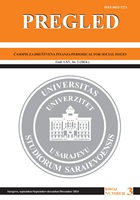Bespovijesno vrijeme Bosne i Hercegovine
Unhistorical Time for Bosnia and Herzegovina
Author(s): Semir HalilovićSubject(s): Political history, Social history, Transformation Period (1990 - 2010), Present Times (2010 - today), Sociology of Politics, Wars in Jugoslavia
Published by: Univerzitet u Sarajevu
Keywords: Bosnia and Herzegovina; Dayton Peace Agreement; international community; peace; global order;
Summary/Abstract: With the Dayton Peace Agreement, Bosnia and Herzegovina entered its ahistorical, critical existential phase of its own historical arc. The possibility for the country to fully integrate within the walls of the European Union within a decade or two melted over time in front of the realpolitik of the West, which left Bosnia and Herzegovina in the form of a fragile state so that in the future it could serve as a currency of regional adjustment. To date, global political leaders have not provided a credible argument that would confirm, without calculation, that they really want to introduce Bosnia and Herzegovina into the community of European states in the same framework as it was accepted into the United Nations. The reasons for this positioning oscillate between global support for the idea of forming three large states of Southeastern Europe, on the one hand, and the need to contain the Muslim political factor, on the other. Both policies have their strong ethnic advocates within Bosnia and Herzegovina itself, which, as a territorially divided and socially xenophobic state, is deprived of its own capacities to participate in its own destiny. Therefore, today's Bosnia and Herzegovina is at an existential minimum, surviving as a country in which the only political blueprint of the advocates of its survival is hope, which, as in all places without an organized future, represents the refuge of the weak. From 1995 to today, hope in the Dayton peace has been waning for decades. while at the beginning of the third decade of the 21st century, at the time of the beginning of the restructuring of the global political order, there was no complete sobering up regarding its perniciousness. For those familiar with arguments and realpolitik, there was no doubt since 1993 and at the latest by 1995 that the project in which the state unitarism changes serve for peace, instead of regeneration of Bosnian state and society, cementing the results of the war. But they represented a persecuted or marginalized minority. The majority intellectual and general Bosnian opinion appropriately contextualized and rather late realized that within the Dayton context, which they advocated and defended so wholeheartedly, Bosnia and Herzegovina and they together with it are, in fact, its possible future victims.
Journal: PREGLED - časopis za društvena pitanja
- Issue Year: LXV/2024
- Issue No: 3
- Page Range: 1-20
- Page Count: 20
- Language: Bosnian, Croatian, Serbian

